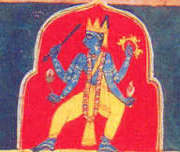Fundamental Aspects of Sankaradeva's Religion - Cāri Vastu

The four main factors of the religion preached by Srimanta Sankaradeva are referred to as Cāri Vastu or the Four Reals, in Assam Vaisnavism. These Four Reals are:
- Guru (The Preceptor)
- Deva (The Deity)
- Nāma (The Name)
- Bhakata (The Devotee)
A thorough analysis of these four factors has been done by Madhavadeva, the foremost disciple of Sankaradeva, in his most celebrated work, the Nām Ghosā.
Guru
The function of the preceptor is to give counsel to man to realise the Deity. This preceptor may either be a man or a Sastra or a treatise. Mere literary learning, however, cannot make a man fit to be a preceptor. He must have the qualification of having been a sincere devotee of the Supreme Deity. Such a preceptor can show the right way to his disciples. Madhavadeva in his Nām Ghosā, holds that Srimanta Sankaradeva alone deserves the epithet of preceptor and his instructions are alone to be followed by those who profess his path.
Deva
 Madhavadeva, in his Nām Ghoshā, establishes on the basis of the Vedas, Upanishads, the Gitā and the Bhāgavata that Krishna, Who has been, being worshipped by Brahma and Siva, the chief of the Devatās (gods) recognised in the Hindu Sastras, and by Lakshmi, the goddess worshipped by all the gods, and Who incarnated Himself in different forms in different ages to educate His creatures to realize their ownself, Who is the Lord of time and illusion (Māyā), Who alone has self-consciousness, Who is omnipresent and omniscient, and has neither beinning nor end, Who is the soul of the Universe and the dispenser of all individual souls, is the only divine Deity whom a man ought to recognise, realise and worship. Madhavadeva devotes more than half of his scripture in the vindication of this statement.
Madhavadeva, in his Nām Ghoshā, establishes on the basis of the Vedas, Upanishads, the Gitā and the Bhāgavata that Krishna, Who has been, being worshipped by Brahma and Siva, the chief of the Devatās (gods) recognised in the Hindu Sastras, and by Lakshmi, the goddess worshipped by all the gods, and Who incarnated Himself in different forms in different ages to educate His creatures to realize their ownself, Who is the Lord of time and illusion (Māyā), Who alone has self-consciousness, Who is omnipresent and omniscient, and has neither beinning nor end, Who is the soul of the Universe and the dispenser of all individual souls, is the only divine Deity whom a man ought to recognise, realise and worship. Madhavadeva devotes more than half of his scripture in the vindication of this statement.
Nāma
The third factor is Name or Nāma. Madhavadeva, in his Nām Ghosā, establishes the importance of chanting the name of the Supreme Deity in devotion. He has based his argument on the following:
The only religion prescribed for man in this iron-age is chanting the Name of the Deity. Rules and formalities are to be followed in the observance of other forms of rituals and different classes of persons are permitted by Sastras to perform different rituals but the names of God can be sung by all classes of people and no rules and formalities are to be observed in doing so. So God Who is Benevolent and Who is equal to all, became a special lover of His Names.
His names are all descriptive and they indicate His different attributes or aspects. If their significance is properly understood, they can give a real insight into the Greatness of God, and His working. As his attributes or aspects are innumerable or infinite, so are His names inexhaustible. God, the Deity cannot be dissociated from His name. God exists where His name exists. In other words, a mental image of the form or attributes of the Deity is formed as soon as the name associated with that image or attribute is conceived or pronounced. It helps in the realisation of the soul.
There is a belief that the feet of the Deity are impressed in the heart of every being and there is a covering of illusion or Māyā over it. The only means to see the feet of the Deity is Chanting of His Name. It acts like a lamp and breaks through the illusion.
It is always seen that at the time of death, highest consideration in expectation of salvation is given to the utterance of the Name of the Deity.
There are parables in Hindu Sāstras that persons with despicable character attained salvation by uttering the Name of the Deity.
Chanting the name of the Deity can give everything to a devotee and make the Deity subordinate to him. God being omnipresent cannot be called in or requested to depart, being above all forms cannot be imagined in mind, beyond the reach of language used by men, cannot be worshipped. Consequently, the only thing that a man can do to purify himself is to chant His name.
Bhakat
The last but not the least factor is His devotee (bhakata or bhakta). God manifests Himself through his devotees and they are all to Him and He is all to them.
Conclusion
So the form of religious practice advocated by Sankaradeva and Madhavadeva is that a man ought to take instruction from a preceptor or Sastra, take sarana or shelter in Lord Krishna, concentrate his mind to think of His form in his heart, chant His names and dedicate himself in the service of His devotees.